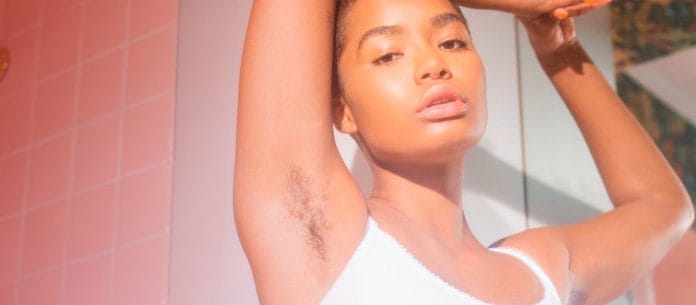The ad manages to package and sell the fickle and ephemeral idea of choice to women.
I remember the first time I shaved. Years and years of razor advertisements had taught me that the soap suds would part and glistening, hairless skin would emerge. I would then turn around and smile benignly at the camera that would admire my body and a voiceover would announce the existence of a new me.
Baby me didn’t quite know that those advertisements weren’t geared for little Indian girls with very dark hair. What I realised right then was that body hair removal was a scam I was possibly going to buy into for the rest of my life – and I guess I was right.
Billie, a US-based razor company that made waves earlier this year by claiming to do away with the ‘pink tax’, the arbitrary overcharging most ‘women-oriented’ products suffer from, has now come out with another sure-shot social media hit.
The brand’s new ad campaign is, as far as memory serves, the first hair-removal ad with images of actual hair being removed. Social media, as it does, cannot stop itself from lauding the fact that a brand has finally acknowledged basic human physiology. The advertisement pulls another coup by ending with a bang. ‘Shaving is a choice’, it proclaims loudly, rattling off the very words women were starving to hear all these years.
The campaign works not because of the hair it shows, which is well and good. It works because it managed to package and sell the fickle and ephemeral idea of choice. The ad represented everything that capitalism tries to emote while hijacking feminism. It represented the idea that empowerment and emancipation can somehow be bought off the supermarket shelves.
It’s a tantalising, irresistible spiel that allows us the illusion of making this choice for ourselves. And this is precisely why ads like these are insidious, harmful and exploitative.
This isn’t the first time we’ve been told that we can be the feminists we want to be by just buying into the latest beauty industry gimmick, and it certainly won’t be the last. We are told that we can find our definition of freedom at the simple cost of an innocuous bathing bar, lip gloss, or shampoo.
Closer home, this vaguely echoes the kind of rebranding that fairness creams have attempted, with Fair & Lovely trying to tell us that using the cream won’t make you ‘fair’, but help you achieve your dreams.
The ludicrous conflation is not just insulting, it’s dangerous, especially in a country that’s already dealing with colourism and its relation with caste, class and regional identity. The fairness cream ad co-opts the important conversations happening around merit and capability and retrofits them into its own agenda. Doing this could even earn the brand an award for a well-made, heart-tugging story of a woman beating the odds. But what of the message it successfully reduces to its bare bones? What of all the conversations it silences?
The ad represented everything that capitalism tries to emote while hijacking feminism. It represented the idea that empowerment and emancipation can somehow be bought off the supermarket shelves.
As women discover their personhood after generations of having no way to articulate it, brands like Billie and Fair & Lovely, with their slick documentary style videos and sympathetic overtones, whoosh in to fill the gap in the female lexicon.
By simplifying so much of what women are trying to say, these brands have turned a movement, which is meant to empower women, into yet another attractive roadshow. Women, who yearn for a representation of what they think in a world that’s constantly telling them how they should think, buy into such narratives.
Billie, in the garb of doing something radical, is pandering to the same gaze that the body hair removal industry always had on women. Anything that aims at selling freedom must be interrogated because freedom cannot be sold. At best, it can be advocated. Hashtag feminism, by the virtue of its simplification, is vulnerable to exploitation by capitalism. The Billie razor ad is a fine example of the same.
Andi Zeisler says it better than I do. In her book, We Were Feminists Once, she says “celebrating the ads themselves simply celebrates advertisers’ skill at co-opting women’s movements and selling them back to us – and then rewards us for buying in”.
There are no free lunches, and no easy emancipation – the allure of buying feminism off supermarket shelves is strong, but if we must fight it.
Harnidh Kaur is a poet and feminist







This article is fire!? AMAZING analysis Harnidh Kaur!
As for the comment about going back to ads without hair, I’d encourage you to look at all of Billies ads. They have one where all the women are hairless, and wearing HEELS while shaving wet and dry. By catering to the male gaze Billie has used sexism to sell product.
THIS is feminism. Analyzing the way companies capitalize on our movements for change without truly investing in that change.
Thank you for this incredible article Kaur!
So we should just go back to razor ads with no hair? Because that’s what feminism is? Gotchya. ?
Honestly, I like you Harnidh but this article is shitty. Analogy of Billie’s ad & Fair Lovely’s ad doesn’t make sense.
Anyway, that’s just my point of view. All the best for upcoming articles!